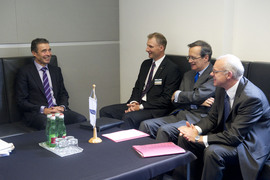At the Lisbon Summit in November 2010, the Allies underlined the importance of the OSCE as a regional security organization and a forum for dialogue on issues relevant to Euro-Atlantic security, as demonstrated by the Corfu Process. (The Corfu Process was launched at an informal meeting of OSCE foreign ministers in June 2009, in the wake of the August 2008 crisis in Georgia, which made clear the continued dangers posed to collective security by unresolved conflicts in the Euro-Atlantic area. It aims to restore confidence and take forward dialogue on wider European security.)
Encompassing the political/military, economic/environmental, and human dimensions, the OSCE plays an important role in promoting security and cooperation. The Allies aim to further enhance the NATO’s cooperation with the OSCE, both at the political and operational level, in particular in areas such as conflict prevention and resolution, post-conflict rehabilitation, and in addressing new security threats.
At a political level, NATO and the OSCE consult each other on regional security issues. Each has also separately developed initiatives aimed at countries in the Mediterranean region.
At the operational level, cooperation in conflict prevention, crisis management and post-conflict rehabilitation has been particularly active in the Western Balkans.
The two organizations complement each other’s efforts on the ground. NATO initiatives to support defence reform, including arms control, mine clearance and the destruction of stockpiles of arms and munitions, dovetail with OSCE efforts aimed at preventing conflict and restoring stability after conflict.
As well as coordinating initiatives on the ground, the NATO and the OSCE regularly exchange views and information on key security-related thematic issues, such as border security, disarmament, arms control (in particular, controlling the spread of small arms and light weapons), energy security and terrorism.
The two organizations also collaborate on environmental issues that are a threat to security, stability and peace through the Environment and Security Initiative (ENVSEC)¹.
Close cooperation between NATO and the OSCE is an important element in the development of an international “Comprehensive Approach” to crisis management, which requires the effective application of both military and civilian means. At Lisbon, the Allies decided to enhance NATO’s contribution to a comprehensive approach to crisis management as part of the international community’s effort and to improve NATO’s ability to deliver stabilization and reconstruction effects.
The decision – taken by the OSCE at its November 2007 ministerial meeting in Madrid – to engage in Afghanistan, opened a new field for cooperation between the two organizations as part of a comprehensive approach among international actors.

